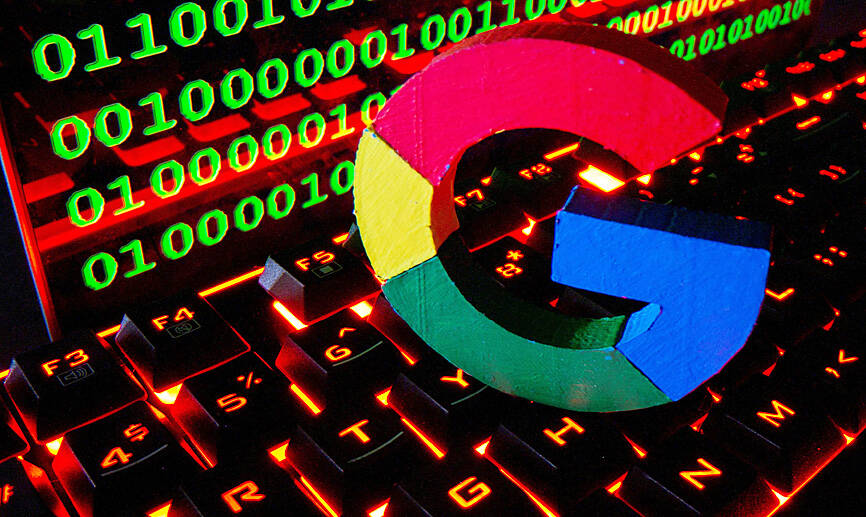A Chinese software engineer working for Alphabet Inc’s Google was charged by the US Department of Justice with stealing trade secrets for developing artificial intelligence (AI) from the company’s supercomputing data centers.
Linwei Ding, 38, a Chinese national and resident of Newark, California, who was hired by Google in 2019, has been charged with four counts of trade secrets theft, the US Department of Justice said in a statement on Wednesday.
“We allege the defendant stole artificial intelligence-related trade secrets from Google while secretly working for two companies based in China,” US Attorney General Merrick Garland said in a statement. “We will fiercely protect sensitive technologies developed in America from falling into the hands of those who should not have them.”

Photo: Reuters
A Google spokesperson said Ding acted alone and that the company was able to act quickly and refer the case to law enforcement after discovering the problem.
“We have strict safeguards to prevent the theft of our confidential commercial information and trade secrets,” Google spokesperson Jose Castaneda said in an e-mailed statement. “We are grateful to the FBI for helping protect our information and will continue cooperating with them closely.”
Ding, also known as Leon Ding, allegedly transferred sensitive information from Google’s network to his personal email and cloud accounts while secretly affiliating himself with two China-based companies working in the AI industry, the Justice Department said.
Ding allegedly helped form one of the unidentified companies. He did not disclose his connection to either company to Google. The Justice Department does not allege that Ding provided the companies with specific data he stole from Google.
The case marks the first significant enforcement action since Deputy Attorney General Lisa Monaco announced last month that the Justice Department’s disruptive technology strike force would focus on violations related to the use or transfer of AI technology.
The US Attorney’s office in San Francisco has in recent years prosecuted multiple cases over intellectual property theft involving China, including three ex-Apple Inc engineers accused of stealing trade secrets from the company’s autonomous driving project to take with them for jobs with Chinese companies.
Ding was arrested on Wednesday in Newark. He faces a maximum penalty of 10 years in prison and a fine of as much as US$250,000 for each count if convicted.
The technology Ding allegedly stole “involves the building blocks of Google’s advanced supercomputing data centers, which are designed to support machine learning workloads used to train and host large AI models,” the Justice Department said.
While he was employed by Google, Ding had access to confidential information about hardware, software and the AI models and applications they supported, some of which he is alleged to have uploaded into personal accounts.

TAKING STOCK: A Taiwanese cookware firm in Vietnam urged customers to assess inventory or place orders early so shipments can reach the US while tariffs are paused Taiwanese businesses in Vietnam are exploring alternatives after the White House imposed a 46 percent import duty on Vietnamese goods, following US President Donald Trump’s announcement of “reciprocal” tariffs on the US’ trading partners. Lo Shih-liang (羅世良), chairman of Brico Industry Co (裕茂工業), a Taiwanese company that manufactures cast iron cookware and stove components in Vietnam, said that more than 40 percent of his business was tied to the US market, describing the constant US policy shifts as an emotional roller coaster. “I work during the day and stay up all night watching the news. I’ve been following US news until 3am

UNCERTAINTY: Innolux activated a stringent supply chain management mechanism, as it did during the COVID-19 pandemic, to ensure optimal inventory levels for customers Flat-panel display makers AUO Corp (友達) and Innolux Corp (群創) yesterday said that about 12 to 20 percent of their display business is at risk of potential US tariffs and that they would relocate production or shipment destinations to mitigate the levies’ effects. US tariffs would have a direct impact of US$200 million on AUO’s revenue, company chairman Paul Peng (彭雙浪) told reporters on the sidelines of the Touch Taiwan trade show in Taipei yesterday. That would make up about 12 percent of the company’s overall revenue. To cope with the tariff uncertainty, AUO plans to allocate its production to manufacturing facilities in

Six years ago, LVMH’s billionaire CEO Bernard Arnault and US President Donald Trump cut the blue ribbon on a factory in rural Texas that would make designer handbags for Louis Vuitton, one of the world’s best-known luxury brands. However, since the high-profile opening, the factory has faced a host of problems limiting production, 11 former Louis Vuitton employees said. The site has consistently ranked among the worst-performing for Louis Vuitton globally, “significantly” underperforming other facilities, said three former Louis Vuitton workers and a senior industry source, who cited internal rankings shared with staff. The plant’s problems — which have not

COLLABORATION: Given Taiwan’s key position in global supply chains, the US firm is discussing strategies with local partners and clients to deal with global uncertainties Advanced Micro Devices Inc (AMD) yesterday said it is meeting with local ecosystem partners, including Taiwan Semiconductor Manufacturing Co (TSMC, 台積電), to discuss strategies, including long-term manufacturing, to navigate uncertainties such as US tariffs, as Taiwan occupies an important position in global supply chains. AMD chief executive officer Lisa Su (蘇姿丰) told reporters that Taiwan is an important part of the chip designer’s ecosystem and she is discussing with partners and customers in Taiwan to forge strong collaborations on different areas during this critical period. AMD has just become the first artificial-intelligence (AI) server chip customer of TSMC to utilize its advanced